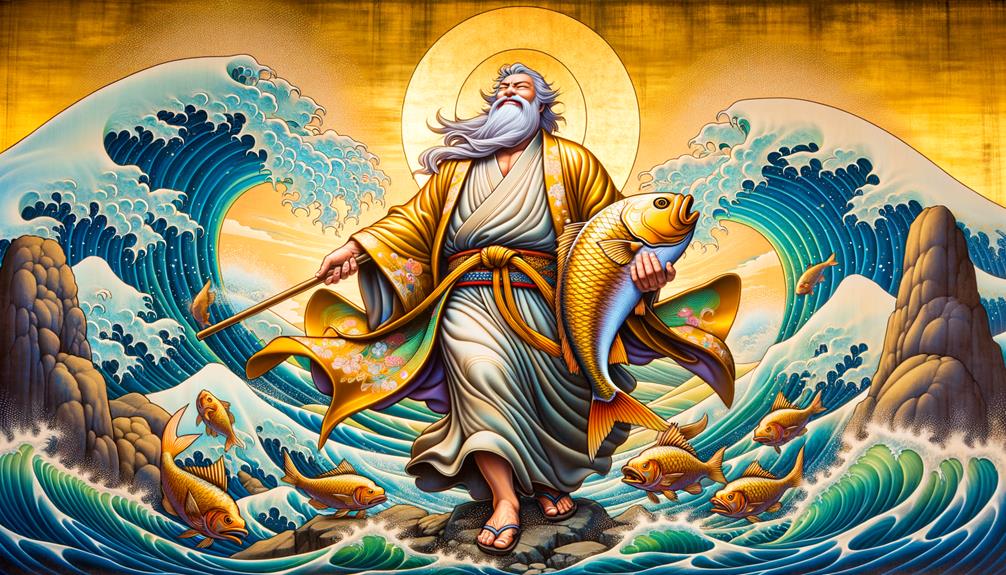Ebisu, the Luck Fishermen's God, holds deep significance in Japanese mythology. His tale, originating from the sea, embodies resilience and prosperity. Picture him smiling, fishing rod in hand, with a glistening Tai fish. Ebisu's transformation from Hiruko and his enduring legacy captivate us. Let's explore this fascinating figure's symbolism and journey.
Ebisu's story resonates because it illustrates overcoming adversity. Once known as Hiruko, he faced challenges before emerging as a beloved deity. His fishing rod and ever-present smile symbolize sustenance and positivity in the face of hardship. The Tai fish represents good fortune, reflecting Ebisu's role as a bringer of luck and abundance.
Contemporary Japanese culture embraces Ebisu as a revered figure. Shrines honor him, and festivals celebrate his mythic origins. His imagery pervades art, literature, and popular media. Ebisu reminds us that perseverance and an optimistic spirit can lead to prosperity, making his story timeless and relatable.
Origins as Hiruko
A mythic figure adrift, Hiruko, the leech child Izanami birthed, voyaged on a reed boat's whim. Japanese lore initially portrayed Hiruko as an outcast, limbless and frail due to divine missteps, abandoned to the ocean's mercy.
Yet fate steered Hiruko's course to the Ainu's shores. This indigenous people, deeply rooted in nature's rhythms, embraced the child. Their compassion nourished Hiruko's transformation from a fragile being into one of fortitude as legs sprouted and vitality bloomed.
Hiruko's odyssey from discarded to empowered resonates with resilience, growth, and the profound impact of acceptance. The Ainu's nurturing hands recast Hiruko's tale from despair to hope, paving his emergence as Ebisu, the luck and prosperity deity.
Ebisu's Legends
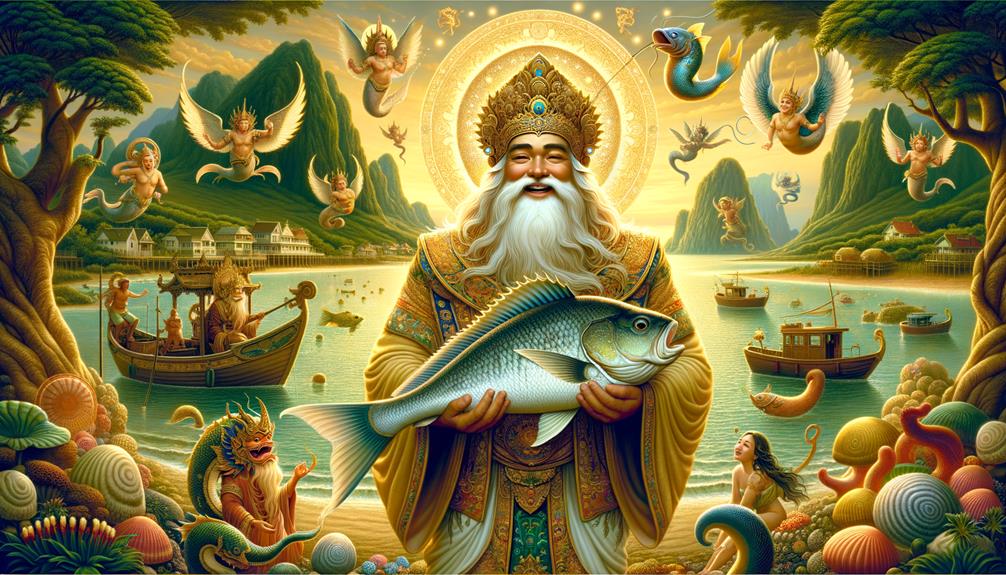
The story of Ebisu, one of Japan's Seven Lucky Gods, resonates with resilience and perseverance. Born as Hiruko, a child without bones or limbs, Ebisu overcame his physical challenges, growing legs by age three. From disability to divinity, Ebisu transformed into the Laughing God, symbolizing triumph over adversity.
Unlike thunderbolt-wielding deities, Ebisu carries humble symbols – a fishing rod and a red sea bream, representing sustenance and abundance. Fishermen honor Ebisu, praying for safety and bountiful catches, believing in his divine protection.
On the twentieth of the tenth month, people celebrate Ebisu's journey, reminding us that joy can arise from struggles. His story lives on as a cherished tale of a benevolent protector who bestows prosperity and good fortune upon those who seek his blessings.
Symbolism and Attributes
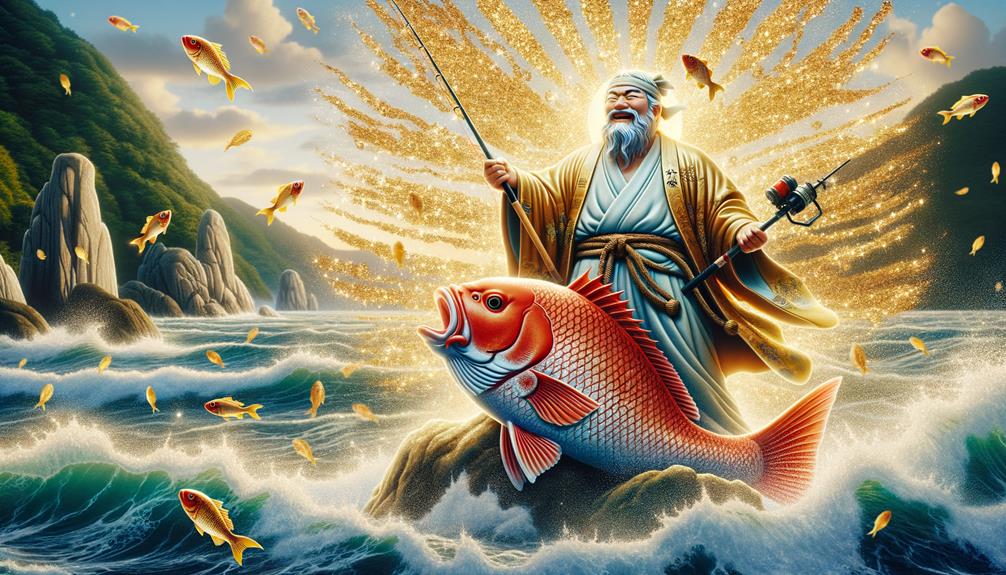
Ebisu's fishing rod and tai fish aren't mere symbols – they represent prosperity knocking at life's door. The jolly figure with a radiant smile captures resilience and joy's essence. These iconic traits transcend the divine, striking a chord with everyone longing for abundance and good fortune.
Sacred Fishing Rod
Ebisu's sacred fishing rod encapsulates the blessings of providence and abundance for maritime communities. It transcends being a mere tool, symbolizing the lifeblood of fishing livelihoods and sustenance. In Ebisu's hands, the rod becomes a manifestation of prosperity and success on the sea.
This mythic journey shines a light on the rod as a talisman of luck and bountiful catches for fishermen navigating the ocean's uncertainties. It reminds that divine favor can uplift entire communities dependent on the sea's bounty.
The fishing rod aligns with symbols like Hermes' staff, guiding and protecting mariners voyaging into uncertain waters. It signifies Ebisu's role as the divine benefactor of fishermen and maritime wealth. Through this sacred instrument, Ebisu's legacy as the god of sea prosperity endures.
Tai Fish Symbolism
The Tai fish, radiant in crimson, embodies the promise of abundance across maritime cultures. Known as the red sea bream, its vivid hue represents vitality and boundless potential for prosperous outcomes in business and fishing ventures.
In Japanese mythology, the Tai fish accompanies Ebisu, the god of fishermen and luck, guiding the path to a bountiful harvest. This partnership reinforces the connection between divine favor and earthly success, where glimpsing the Tai fish symbolizes the rewards awaiting those who honor the sea's blessings.
Across mythologies, the Tai fish's profound symbolism represents humanity's enduring quest for prosperity. This crimson sea creature transcends being a mere fish; it personifies the abundant gifts bestowed upon those who revere the sea and its divine guardians.
Ebisu's Distinct Appearance
In Japanese mythology, Ebisu stands out with his plump, smiling face, symbolizing prosperity and good luck for those seeking fortune from the sea. This cheerful fisherman embodies resilience and abundance.
Ebisu's distinct appearance carries deep meaning. Holding a fishing rod and a large red sea bream, he represents the ocean's bounty and the accompanying luck. His Kazaori Eboshi hat signifies his divine maritime connection. Despite physical challenges—being slightly crippled and deaf—Ebisu's ever-cheerful expression reflects his positive attitude and generosity.
| Item | Symbolism | Meaning |
|---|---|---|
| Fishing Rod | Abundance | Success in ventures |
| Red Sea Bream | Prosperity | Wealth and good fortune |
| Kazaori Eboshi Hat | Divine Status | Connection to the ocean |
| Plump Figure | Generosity | Resilience and perseverance |
| Joyful Expression | Positive Attitude | Business success and luck |
Ebisu's physical traits, like his plump figure and joyful expression, symbolize the qualities that bring business success and the unwavering perseverance required. He embodies the virtues of hard work and optimism.
Worship and Rituals
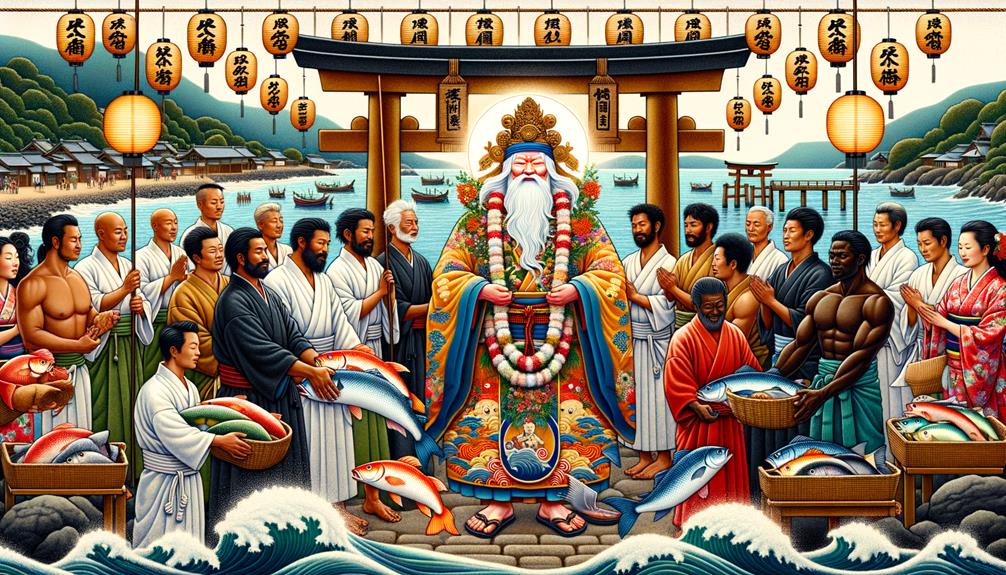
Among the sacred rituals honoring Ebisu, I'm drawn to the vibrant offerings of sea bream, sake, and rice – each symbolizing good fortune, success, and prosperity. For Japanese culture, these aren't mere tokens; they hold deep spiritual meaning, transforming simple acts into profound devotions.
Across Japan, pilgrims journey like heroes seeking Ebisu's divine favor. They present their tributes before stone visages, hoping to receive blessings. The sea bream represents the ocean's bounty, reflecting Ebisu's roots as a fisherman's deity. Sake, fermented from rice, symbolizes earth and water's unity, while rice epitomizes sustenance and abundance.
These rituals extend beyond temples; personal worship involves stone Ebisu statues purchasable online. As a farm deity too, Ebisu embraces agricultural prosperity. Each devotional act, whether at a grand shrine or humble home, connects our mortal endeavors with celestial favor.
Ebisu in Modern Culture

Ebisu's timeless presence echoes through Japan's cultural fabric, weaving together ancient mythology and modern-day expressions. In anime like Noragami, the Laughing God shares the screen with other deities, reminding us that his spirit endures.
His image adorns advertisements, symbolizing prosperity in tangible ways. At the Grand Shrine of Izumo in Chugoku, worshippers maintain the centuries-old tradition of honoring Ebisu, creating a bridge between past and present.
While less prominent in video games, Ebisu's essence remains ingrained in society. His symbolism of good fortune persists, evolving alongside contemporary culture. Like mythic heroes on their journeys, some legends transcend eras, remaining relevant by adapting to the times.
Influence on Business and Commerce
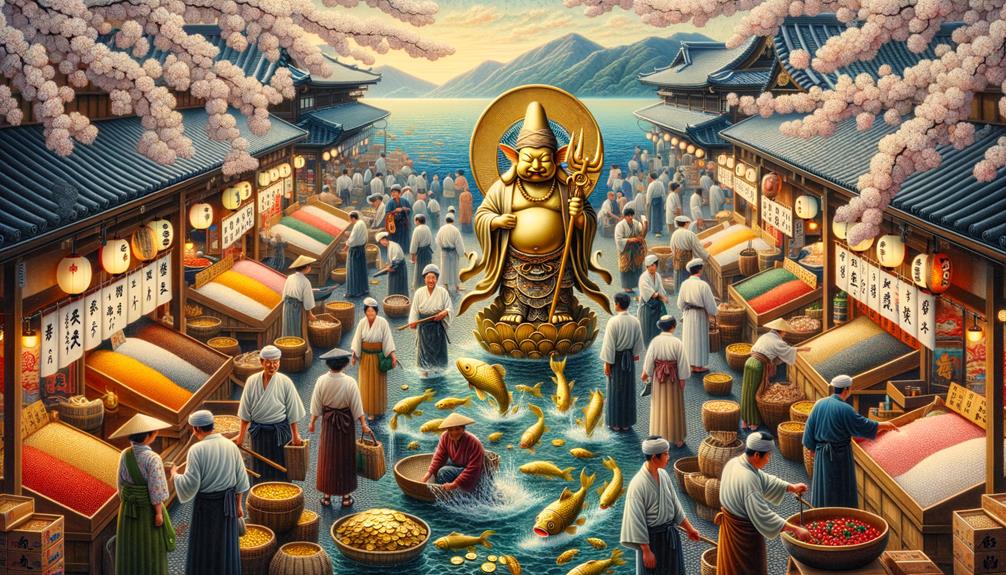
Ebisu's spirit resonates throughout modern Japanese culture, also guiding businesses and merchants towards prosperity. The revered Japanese god of luck, one of the Seven Gods of Good Fortune, has long symbolized wealth and success. Across Japan, business owners often display Ebisu's statues and symbols in their shops, embodying aspirations for thriving commerce and fruitful transactions.
Envision a fledgling merchant embarking on their entrepreneurial journey, guided by Ebisu's presence. This deity, portrayed with a fishing rod and a sea bream, represents the ocean's bounties – a metaphor for the riches of prosperous ventures. Entrepreneurs and traders regard Ebisu as a promise of abundance, a divine ally on their path to prosperity.
Ebisu's influence transcends mere superstition. By invoking this Japanese god of luck, businesses align themselves with age-old traditions celebrating hard work and good fortune. His ubiquitous image in bustling marketplaces serves as a powerful reminder that prosperity, akin to a well-caught fish, results from a blend of skill, effort, and a touch of serendipity.
Frequently Asked Questions
Who Is Ebisu the Fishing God?
Ebisu, the jovial fishing deity, promises fishermen prosperous catches and safe travels. Despite humble beginnings, he now represents triumph over adversity and abundant fortune.
Who Is the Shinto God of Fishermen?
As a fisherman's guardian, I'm Ebisu – the lucky god who guides seafarers to plentiful hauls. My origins trace back to Hiruko, the boneless child, but I've transformed into a joyous deity symbolizing resilience on life's journey. Fishing folk celebrate me for bringing prosperity through bountiful catches.
Who Is the God of Fisherman?
The god of fishermen personifies endurance and contentment, steering us through life's storms. This deity acts as an unwavering guide, promising abundance and safe shores.
What Does Ebisu Symbolize?
Ebisu signifies the sea's plentiful gifts, prosperity, and joyful fortune. His smile and attributes remind us of life's rewarding journey towards fulfillment and success. The seafaring deity embodies the ocean's generosity, inspiring us to appreciate nature's bounties and work diligently towards our aspirations.

